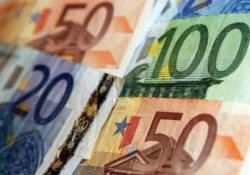|
 Euro
edges up on better-than-expected ECB stress tests Euro
edges up on better-than-expected ECB stress tests
 Send a link to a friend
Send a link to a friend
[October 27, 2014]
By Jemima Kelly
LONDON (Reuters) - The euro edged up
against the dollar on Monday after the European Central Bank's stress
tests found smaller-than-expected capital requirements among European
banks, lifting some of the gloom surrounding the euro zone.
|
|
 The main focus in the European session was on German business
sentiment data due at 5:00 a.m. EDT, which is expected to show a
slight fall in morale. Traders said any sharp deterioration in
sentiment could see the euro's gains capped. The main focus in the European session was on German business
sentiment data due at 5:00 a.m. EDT, which is expected to show a
slight fall in morale. Traders said any sharp deterioration in
sentiment could see the euro's gains capped.
Twenty-five out of the euro zone's 130 top lenders failed the ECB's
landmark health checks at the end of last year but most have since
repaired their finances, the central bank said on Sunday.
Painting a brighter picture than had been expected, the ECB
concluded that banks' capital holes had chiefly been plugged,
leaving only a modest 10 billion euros to be raised.
Some traders were concerned by comments made by ECB Vice President
Vitor Constancio, who said on Sunday that the stress tests did not
take into account a possible deflationary scenario, "because we
don't consider that deflation is going to happen".
"There are some positives from the stress tests and it could have
been a whole lot worse," said Neil Mellor, a currency strategist at
Bank of New York Mellon in London.

"But to have not fully taken deflation into account in the tests, if
Constancio's accusations are correct, ... makes the tests a little
incomplete, which possibly explains why the euro isn't vaulting
higher."
The common currency last traded at $1.2692, up 0.2 percent on the
day, extending its recovery from a two-week low of $1.2614 set on
Thursday.
In Asian trade, the euro rose above $1.27 as traders digested the
results of the tests.
Demand for riskier assets was muted ahead of crucial central bank
policy meetings this week.
[to top of second column] |

Having risen above 108 yen in Asian trade, the dollar fell by 0.2
percent against the safe-haven Japanese currency to 107.90 yen, amid
lingering concerns on the state of the global economy as Europe,
China and Japan all appear to suffer one problem or another.
Although fears of possible recession in the euro zone eased slightly
after a surprisingly strong business survey last week, few investors
think Europe is out of woods.
Policy meetings by the U.S. Federal Reserve and the Bank of Japan
later this week will be watched closely for clues on how the central
banks perceive latest threats to the economy.
"The Fed will likely end its bond buying while maintaining its
pledge to leave rates near zero for a considerable time. That should
underpin risk assets and hamper the yen," said Minori Uchida, chief
FX strategist at the Bank of Mitsubishi-Tokyo UFJ.
(Additional reporting by Hideyuki Sano in Tokyo)
[© 2014 Thomson Reuters. All rights
reserved.] Copyright 2014 Reuters. All rights reserved. This material may not be published,
broadcast, rewritten or redistributed.
 |